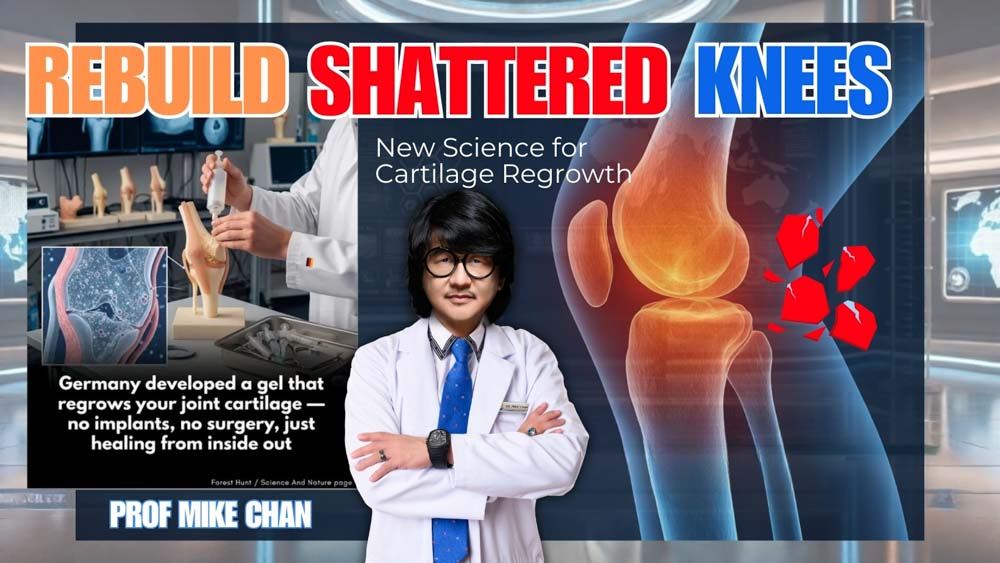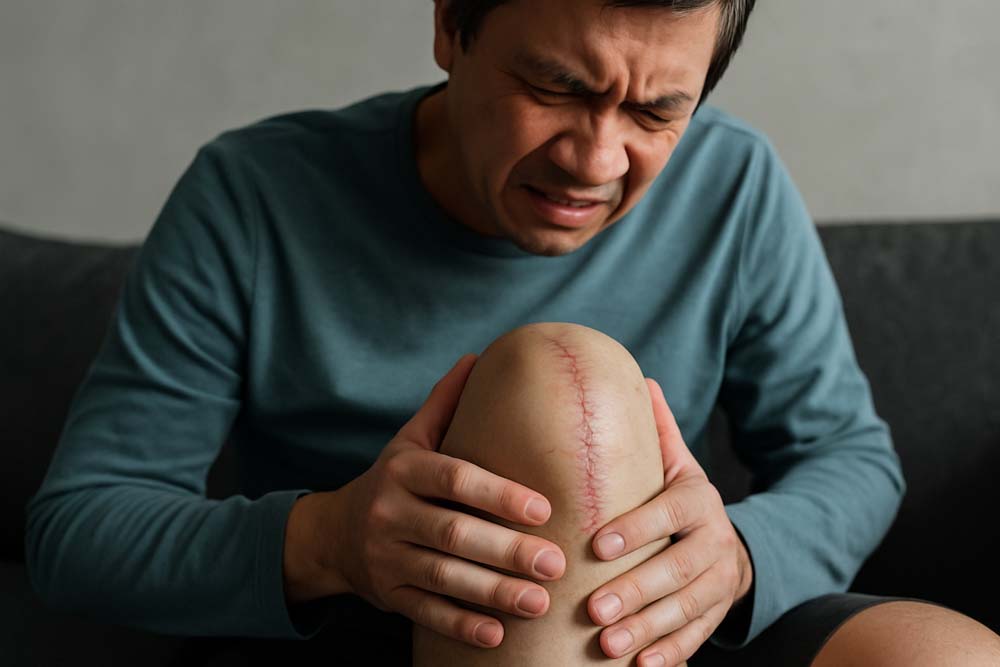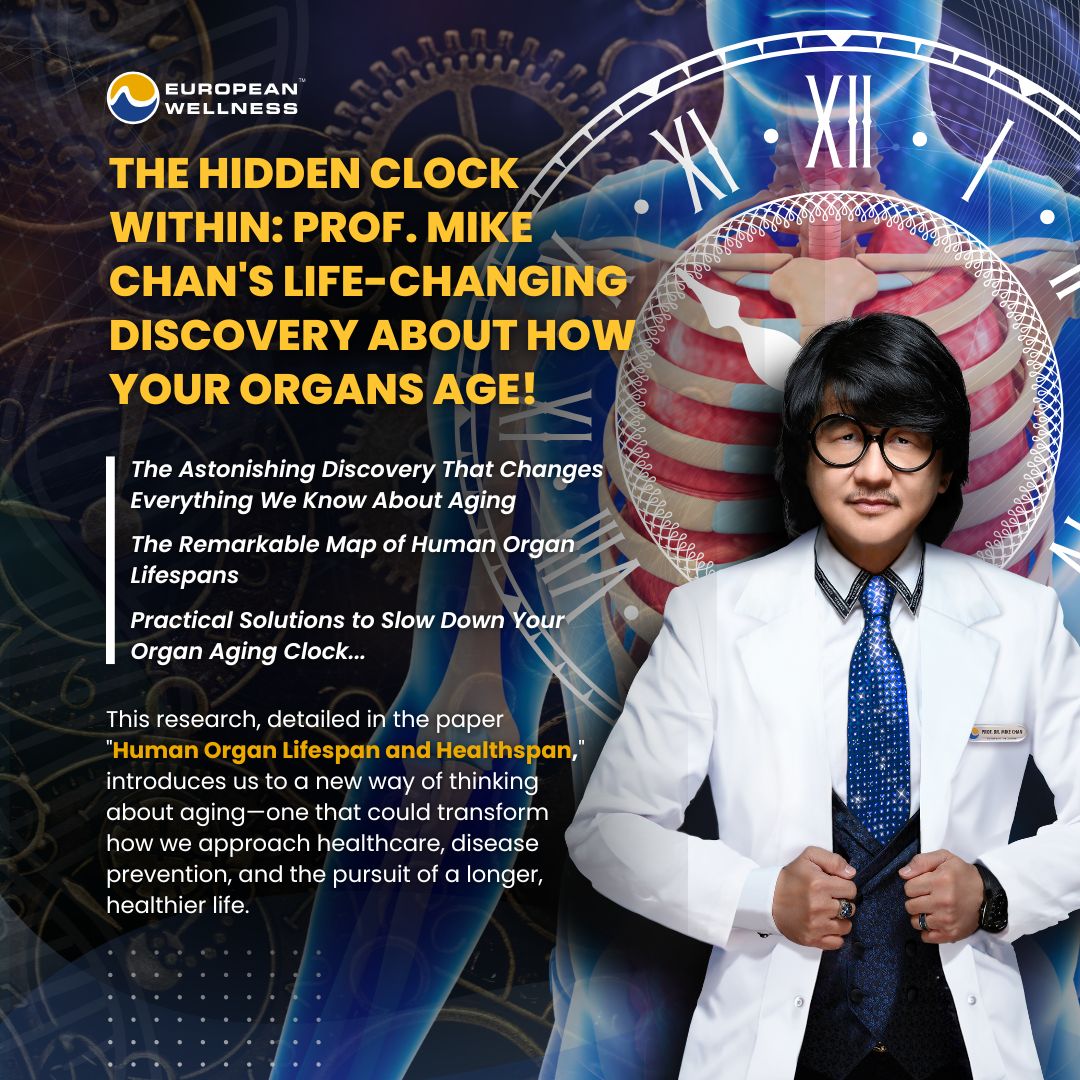A new frontier in cartilage repair. German scientists have developed a bioresorbable gel that regrows…

Prof. Mike Chan: German Cartilage Science Could Rewrite Knee Recovery
A new frontier in cartilage repair.
German scientists have developed a bioresorbable gel that regrows knee cartilage without surgery or implants—offering hope to patients with crushed joints and chronic pain. Prof. Mike Chan explains how this science could replace the need for metal and plastic in orthopedic recovery.
Frankie, 43, (not his real name) suffered a catastrophic kneecap fracture after slipping on concrete steps. The injury left his patella in multiple fragments, requiring urgent reconstructive surgery. Standard treatment involved piecing the bone together with screws and wires, a painful process followed by months of gruelling rehabilitation.
Despite adherence to physical therapy, his recovery stalled. Scar tissue formed. His mobility was limited. Cartilage degradation set in early. By the end of the year, he could walk—but stairs, running, and kneeling were off the table.
“When traditional recovery hits a wall, we must look beyond mechanical repair. Stem cell peptides, placental extracts, and targeted biologics can stimulate the regeneration of cartilage and synovial tissue—restoring not just structure, but function,” said Prof. Chan. “This is where the future of orthopedics lies: healing the joint from the inside out.”
A Turning Point in Orthopedic Recovery
Now, a groundbreaking German innovation in regenerative medicine may soon change that outcome—for Frankie and millions like him.
A team of researchers in Munich has developed a self-regenerating synthetic cartilage implant that triggers the body’s own stem cells to grow new cartilage. The implant, made from bioresorbable hydrogel, dissolves over time, leaving behind fully regenerated, natural tissue.
In preclinical trials, damaged knees regained up to 90% of original function within four months, a dramatic improvement over conventional healing, which often results in permanent stiffness or long-term pain.
“This technology is not just repairing damage—it’s reversing it,” said Prof. Mike Chan, a global expert in regenerative medicine and founder of the European Wellness Biomedical Group.
“For years, doctors have treated knees with metal and plastic. But with this breakthrough, we’re finally talking about living repairs. It’s the difference between survival and restoration.”
Less Invasive, More Promising
Unlike full joint replacements, the new procedure requires only keyhole surgery. It takes less than 45 minutes, with shorter recovery times and fewer complications. Patients report minimal pain and are often able to resume activity within weeks, not months.
Prof. Chan, who has been following the trials closely, believes the technology will soon become standard in sports medicine and trauma care.
“This isn’t science fiction. This is the future of medicine,” says Prof. Mike Chan.
“Injury to the knee used to mean a lifetime of compromise. This changes that narrative,” he adds. “We’re now looking at true biological regeneration—not just function, but form and feeling.”
A Glimpse Into the Future

When recovery falls short
Frankie, 43, (not his real name) endured a year of pain, metal implants, and rehab after shattering his kneecap. His journey shows the brutal reality of “natural” healing, and why regenerative breakthroughs like Germany’s self-growing cartilage could change lives.
Frankie’s story remains all too common in today’s orthopedic landscape. While his journey ended with partial function and chronic stiffness, emerging options like the German implant promise a fundamentally different outcome.
Germany’s health ministry has fast-tracked clinical trials, with broader approval expected within the next 12–18 months. Once available, the implant could reduce the need for knee replacements and transform post-injury recovery around the world.
“Imagine falling, shattering your knee—and walking again, pain-free, in a few months,” said Prof. Chan.
“That’s not science fiction anymore. That’s where we’re heading.”
New Hope of Healing
As medicine moves from replacement to regeneration, the implications stretch far beyond orthopedics.
For accident victims, athletes, and aging populations alike, this breakthrough signals a future where healing is no longer about managing damage—but undoing it entirely.
And for those like Frankie, it may come just a little too late, but for the next person who slips on the stairs, it could mean the difference between a scar and a second chance.
Follow European Wellness Academy:

